Peardrop-flavoured cure for war. Ukrainian-German doctor on refugees from Ukraine, remedy for losing home, fear of death and power of love
"My name is Ira and I'm from Odesa. I grew up among the tradespeople of Bazarna Square, with literary ambitions and parents who knew how to swear in Yiddish... I have a degree in medicine and a narcissistic personality disorder.
I have lived in Germany since 2018. In 2019 I gave birth to a little person called Sara, in the beautiful town of Kamenz in Saxony," Iryna Finherova described herself in an interview. She spent the last six months working as a family physician in Dresden, Germany.
During this time she has seen several hundred Ukrainian refugees.
Several hundred out of nearly 8 million Ukrainians who left Ukraine after 24 February 2022 in search of a refuge from Russian bombs and missiles: 20% of Ukraine's population. "I have learned how to tell where the person is from based on their complaints. Asthenic young women who lost sleep and appetite are most likely to have come from Kherson.
Women over 60 experiencing panic attacks for the first time in their lives are most likely to have come from Kharkiv. A 40-year-old woman who lost 17 kilograms in the absence of diabetes or cancer is most likely to have come from Mariupol and to have lost a loved one," Iryna writes in her Infopost column. Each refugee has their own story but they share a common history: having gone through one of this war's many circles of hell.
Each of them had different plans and ambitions, sources of inspiration and exhaustion; they wanted to save the world or to hide from the world; to change their lives or to live them to their fullest. But 24 February 2022 became a common denominator to these diverse lives, reducing their diversity to a single shared reality of war. Iryna Finherova devotes all her free time to volunteering.
We wanted to ask her about the common problems Ukrainian refugees encounter in Germany. About German healthcare with its lengthy waiting lists, endless red tape, and stern doctors - all common sources of grief among Ukrainians, judging from social media. About volunteering in Germany and the Plattform Dresden e.V., an initiative which, together with the Ukrainian Greek Catholic parish of St Michael the Archangel in Dresden, helps thousands of refugees and collects tonnes of humanitarian aid for Ukraine.
Our conversation ended up being about something else. About remedies for losing home and the search for a sense of belonging that cannot be claimed by the war. About inoculations against adulthood that can only be administered to children.
About generational memory that can rear its head, triggered by war, and remind you of things long gone by. About how future generations of Russians will ask their forebears: "What did you do during the war?" Just like post-war generations of Germans asked those who came before them. This is Iryna Finherova's story: the story of a German doctor from Odesa, an Odesan writer from Dresden, a Ukrainian volunteer; the story about Ukrainian refugees, remedy for losing home, the force of memory, the fear of death, and the power of love.
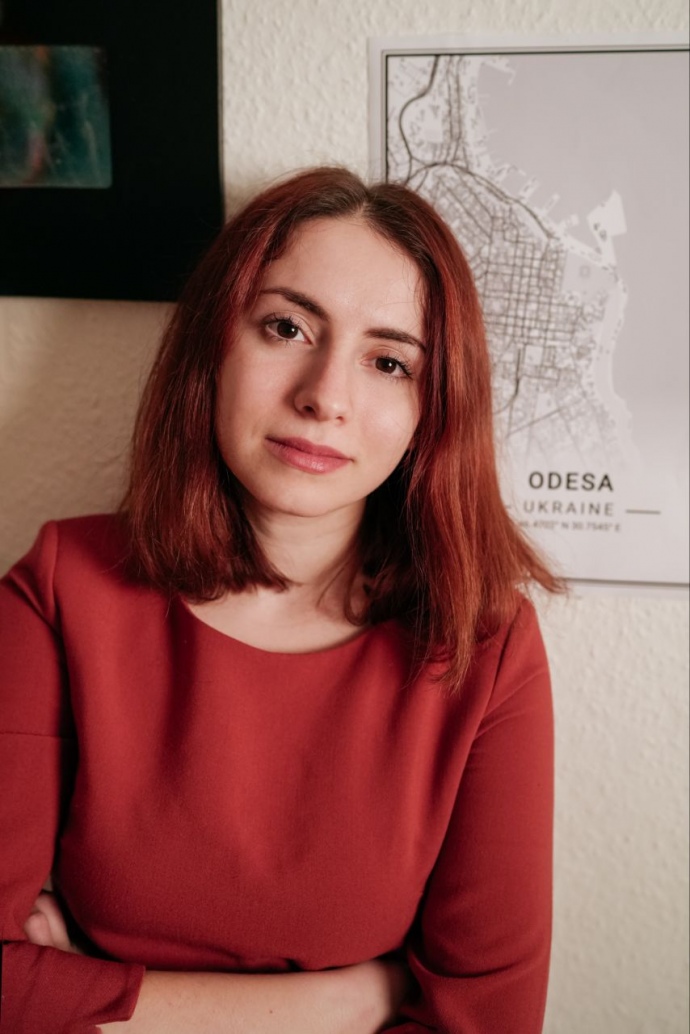 Iryna Fingerova: "There is a German word, Heimweh, translated literally as homesickness.
Iryna Fingerova: "There is a German word, Heimweh, translated literally as homesickness.
A homesickness that causes physical pain. Here it is, the diagnosis."
Photo: Vira DumkePatients from Ukraine, remedy for losing home and the delayed life syndrome
Prescriptions obtained via the public healthcare system are usually red. Private prescriptions are written on green slips.
Opiate prescriptions are yellow. What colour slip should I use to prescribe a sense of home, not a painkiller? What form does the remedy for losing home take?
A solution, a suppository, a pill, or drops? There is a German word, Heimweh, translated literally as homesickness. A homesickness that causes physical pain.
Here it is, the diagnosis. ...Ms O. sprained her calf and came to ask if using diclofenac at 38 weeks of pregnancy was okay. - I found out I was pregnant on 22 February, she said.
She is in her early twenties and came to Germany with a friend. The rest of her family remained in Zaporizhzhia. I looked at her, still almost a child herself, and thought: What is it like for your body to be a home for a new life when you yourself have lost your home?
When you have no walls to call your own, no fridge magnets, no bookshelf, no sofa dotted with cigarette burns? When your mom and your husband are far from you, when you have no one who could help you with your newborn child? When the doctor delivering your baby says "pressen" instead of "push" and you can hardly understand what is going on around you?
When you get anxious every time you see a tram conductor, worried that you've done something wrong again: bought a wrong ticket in the wrong place, or failed to validate it in time? When every time you send a parcel home with someone driving back there you wonder whether to get in the car and also go? What do you lean on when you have no walls to call your own?
When there is nowhere that gives you a sense of strength, when you're unbearably far from the street corner where you first kissed your beloved and the stadium where you spent all night dancing at a concert. When nothing around you evokes any memories of your past, so rich and varied, memories of the times when things were easy and fun and you were carefree. All of this is in your past, and in your future, too.
I often see patients get to know each other in the waiting room and exchange phone numbers. Maybe when you have no home you find refuge in other people. Maybe when you have no walls, you look for a shoulder.
But I can't prescribe human contact.
 Refugees awaiting an evacuation train.Photo: Natalia Kravchuk
Refugees awaiting an evacuation train.Photo: Natalia Kravchuk
There is often a homeless man near a supermarket by my house. We rarely talk; once I gave him a meat pie and he told me, very politely, that he was vegetarian. He has seborrheic dermatitis and constantly scratches his head.
Chronic venous insufficiency. Many Europeans wear shorts even in winter, so I've seen his calves. Chronic malnutrition.
He's always a little bit stoned. But the main symptom of his homelessness is a sense of confusion. He has nowhere to sit and think about what to do with his life.
Life goes on and he follows its wake, hoping that the next time he gets given a pie stuffed with spinach. Everyone's story of homelessness is different. Ms I. came complaining of relentless headaches.
I took her medical history: "Do you sweat profusely? Do you get easily fatigued? Have you lost weight?
Do you have sleep issues?" "Yes," she said. "I am constantly tired; how can I get any rest? I'm just a lodger here.
A German woman took me in, she is wonderful, she let me and my kids have a whole storey in her house. Everything is beautiful, brand new after renovation... But it's not mine!
I have nothing of my own, just my aches and pains. My back hurts like it's being carved." Turned out Ms I. bought a bed for her kids and has spent the last months sleeping on an inflatable mattress.
Not because she has no money, but because buying a bed would mean she has resigned to living here for a long time - and she has no desire to stay here. Delayed life syndrome in action: I will live well, but later, when the war is over. Many people live as though they are in transit, without committing to being here and now.
Others, however - often those who came here from the hottest of hotspots - know that they have to live every day like it's their last one. Like Ukrainian teachers who found jobs in German schools and have set up classrooms for Ukrainian kids here. Like the woman who established a Ukrainian choir even before she was able to move from a refugee camp to a state-sponsored apartment.
Like the actress who came here from Bucha with an infant and, after quickly finding her bearings, organised a Kupala Night celebration near the Elbe River. She later found a way to stage a performance of Serhii Zhadan's poems at a local theatre, making all the necessary arrangements with a German woman she knew. Like hundreds of Ukrainians who gathered in the Dresden Park to clean it up in gratitude for the help the city's residents have offered them.
Like those who created a kindergarten for Ukrainian kids, built purely on people's enthusiasm. Like those who set up the Ukrainian House, a cultural centre, a book club, a movie club, dumpling-making classes, meet-ups for elderly people, chess tournaments, a conversation club, book launches. All of this has been created within less than a year.
Weekly demonstrations. A little girl who gets on the stage whenever she can to sing Oi u luzi chervona kalyna [a Ukrainian folk song - ed.].
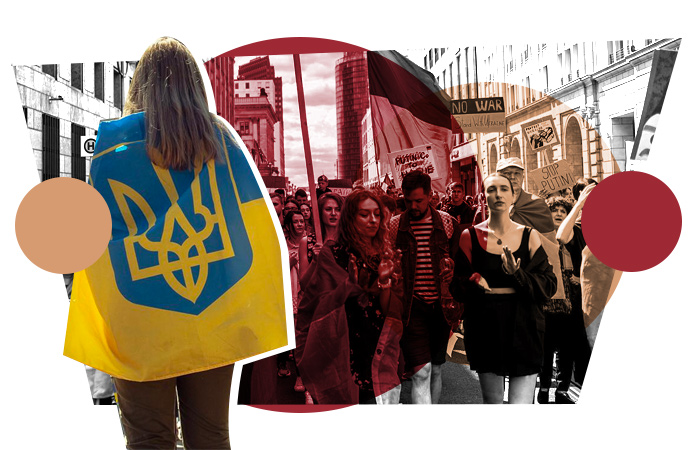
All of those people are creating a new home for themselves. Like snails, but with cracked or broken shells.
Those cracks do not prevent the snail from moving forward. These cracks form a pattern. New lines embroidered on the shirt of national memory.
A new myth. It's difficult to hold on to your sense of self in an unfamiliar environment. It is difficult to truly integrate, rather than assimilate.
It is difficult to long for home and to wish the best - or at least safety - for your children, when the two desires are contradictory. It is difficult to not know where your home is. It is difficult to give birth to a child far from home.
It is difficult when your father dies. Difficult to find a husband. A good job.
Difficult to know where your home is when you come from Donetsk, your son lives in Lviv and has joined territorial defence forces, and your brother was killed in battle. A Russian soldier, your brother was. Where is your home now?
Who will share in your childhood memories about apricot trees and ramshackle huts you built together? Who will share in your memories of your parents? What is it like, to grieve and to simultaneously feel ashamed of your sorrow?
And what if you have spoken Russian your whole life, and now you find yourself unable to speak it, even though it is your mother tongue, your Muttersprache, as they say in Germany? It just happens to be that way. What do you do when your children are asking for ice cream but you feel ashamed to make room for joy?
How to forgive yourself for finding moments of happiness during war? How to keep doing the most important thing, living your own life, without losing connection to a community? How to avoid feeling lonely and crushed when everything that you loved and that gave you your sense of self is far away?
How to know who you are when you have been uprooted? You were once a doctor, an engineer, a businessperson. Now you are someone who fails their language exams.
How to know who you are when you are used to filling awkward pauses during family gatherings with quotes from Soviet films? How to know who you are if the home that you built and the city where you grew up have been destroyed? When all of the atrocities have been committed in the name of the country you have been born in but that has not existed for 30 years.
How to know who you are? Gradually. You reassemble your sense of self, bit by bit.
In the hours you spend looking for the right cheese to make varenyky dumplings in a local Kaufland supermarket, or dancing to Okean Elzy [a popular Ukrainian rock band - ed.] songs by the Martin Luther monument, or whenever you run into fellow Ukrainians in a tram or a train. Can you even lose your home when you know who you are?
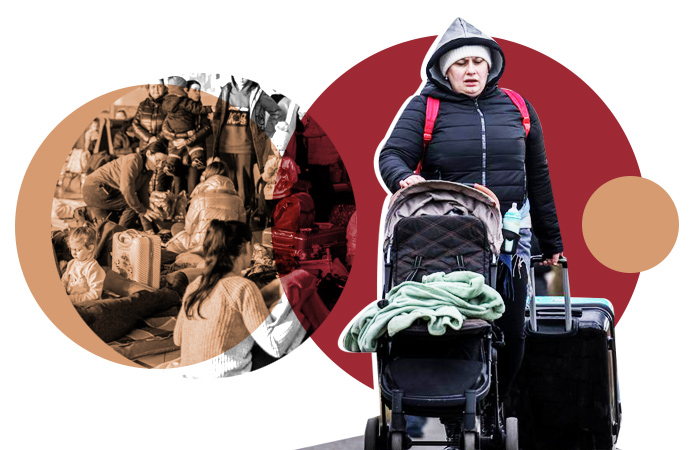
Grandmother, memory, collective responsibility and self-deceit
It's impractical, but I call my grandma on her landline even though she has Viber. I call her landline so I can see the word "Odesa" flash up on my phone's screen.
Makes me feel like I could - almost - touch it. Then I hear grandma's voice. "I'm 93 years old, I'm two fingers short and this bald Putler [a mash-up of "Putin" and "Hitler" - ed.] has started another war.
Time for me to die." My grandma was born during Holodomor [the 1932-33 famine that devastated Ukraine and has been recognised as a state-sponsored genocide of Ukrainian people - ed.], has survived the Holocaust, and now her life has been upended by Russia's military aggression. My grandma can't even go outside, let alone quickly get to the basement: she can barely walk.
She's not worried about explosions: "I'm hard of hearing"; she's worried that she won't have anything to give to her great granddaughter, my daughter, for Hanukkah. Grandma asks me to give her a coin "from grandma Zinka." It's a tradition to give children sweets and money. She has always given me 10 euros.
A strange amount, incomprehensibly large at the time, and difficult to spend. Kids can't just go to an exchange counter. Why euro?
Grandma receives a German pension for former ghetto prisoners. "Bloody money," she calls it. She receives "bloody" euros so she can give some to her grandkids on Hanukkah and put some aside for a rainy day.
Once I asked her how she feels about the German benefits. She said: "It's the least they can do." That's true.
But she must have been accepting this money also because maintaining a connection with her traumatic past was important to her. It was the foundation of her identity, her sense of self. A Jew who survived, a prisoner of ghetto, a fatherless child, always hungry, remarkably hardworking - she cultivated land and taught French in a village school.
She never had time to get sick, or to talk nonsense. She lives because she has to live. I moved to GErmany four years ago.
I have always said that "children should not be responsible for their parents' sins." What difference does it make what happened before? A completely different generation lives in Germany now. I admired my own good judgement and tolerance as I said that.
At the time, I didn't believe in collective responsibility: it wasn't so close to my heart, it didn't feel very urgent. My German textbook had many colourful pictures and talked about multicultural spaces and ecology. But everything has changed.
On 24 February, I did not for a second doubt the collective responsibility of everyone who had come to Ukraine to murder and rape. In 1941 and in 2022. I remember trying to convince my parents and my grandma to apply for immigration as Jews [special conditions apply in Germany to the admission of Jewish immigrants from the countries of the former Soviet Union - ed.] and move with me.
I was afraid that they would have to spend their old age in Ukraine. I failed to understand that quality of life for elderly people is more than the speed with which an ambulance can reach your house. Quality of life is having your people around you and living among familiar spaces.
It gets harder and harder to make home in new spaces with age.
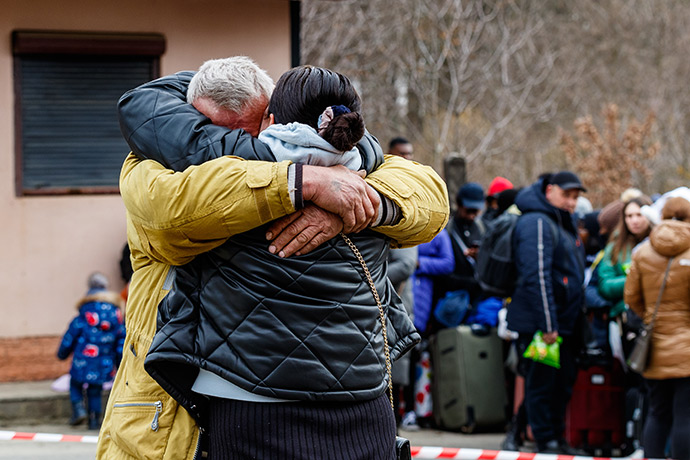 Family members say goodbye to each otherPhoto: Unian
Family members say goodbye to each otherPhoto: Unian
Grandma said: "I will not set foot on the fascist land." She said it then and she has repeated it again. When the Russians were bombing Odesa.
I was looking at my German colleagues who volunteered in Africa, at hipsters in the local park and trans people in municipal trams - what do they have to do with the Third Reich? What are you talking about, grandma, what fascists? That's already three generations in the past!
I took grandma's determination for narrow-mindedness. Eventually I realised, however, that I was deceiving myself. I was working as a doctor in a neurological clinic.
It was February 2021. I was sitting at a table in a small room in the attic. It was a quiet shift, and I could read.
I was reading Jaume Cabre's Confessions which describes how Josef Mengele removed children's knee caps. How years later a different doctor begged for forgiveness. How an SS soldier snatched a violin from a little girl's hands.
A blue light started to flash. The office phone exploded in ringing. I went to the floor below.
It was cold, the hallway light was flickering, and I was still immersed in the book. A 98-year-old patient was waiting for me. He had suffered a stroke and was experiencing hemiparesis on the left side of his body.
He was violent. He tore out a venous catheter and tried to tear out a urinary one. I had to administer a tranquiliser under his tongue.
He refused to open his mouth. I somehow persuaded him. I had to secure him in his bed.
I tried to insert an intravenous catheter again: he needed an infusion. I couldn't do it. His arms were covered in bruises.
His skin was thin like parchment. The nurse firmly held his arms. I looked at the man's medical record.
I felt as though an electric current coursed through my body. He was born in 1924. "What did he do during the war?" I suddenly thought. "Could he imagine that 80 years from then a Ukrainian Jewish doctor and a Syrian nurse would be saving his life?"
I could only get a vein on his leg. He groaned. "It must hurt," I thought.
But I felt nothing. I put a band-aid over the catheter and gave him haloperidol. It took me another few months to be able to return to the book I was reading that night.
I then tucked it away on my bookshelf. You can lie to yourself for a long time, admiring your own good judgement and tolerance, but generational memory will still be there. It will inevitably resurface one February day.
Because everything is preserved in memory. The past and the present.
Motherhood, fear of death, and armour of love and steel
Most young women from Ukraine who show up at the doctor's are suffering from insomnia or somatic symptom disorders: physical symptoms in the absence of underlying illness. They want to do every test imaginable.
Just in case. Because they feel an enormous responsibility: their children have no one but them here. "No one will notice if you die.
Only your children will wail until they themselves die from hunger," a close friend of mine told me upon arriving in Germany in March, a two-year-old son in tow. Thinking about her words now reminds me of Ms A., who came to the hospital this summer. She entered my office.
"How can I help?" I've been asking this question at least 20 times every day ever since I started working as a doctor. It's a ritual: the doctor invites the patient to think about their answer.
I never ask "What brought you here?" People often don't know why they came, but they always know what they want to get out of their visit. "Yes, I need help," Ms A. said at last. "I had a panic attack today, in the middle of a German lesson." Ms A. had issues with her thyroid, varicose veins, and a stroke - the stroke her mother suffered, but who cares, Ms A. is responsible for her mother and her two children, she can't find a school for them, her native city, Kharkiv, was being shelled every day, her husband was hiding in a basement there.
As we talked, I took her pulse, blood pressure, and ankle circumference. Ms A. stumbled over every word, her voice breaking and faltering. She was short of air, her lungs were not coping.
She was feeling too much, her heart couldn't cope with her feelings. She was speaking so fast I started to feel dizzy.
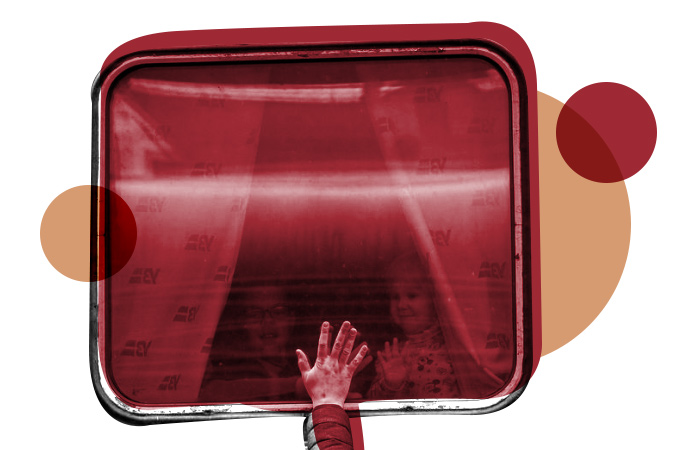
"When I get really overwhelmed and I lose touch with reality, I find some relief in conjugating German verbs," Ms A. suddenly said. "Gehen, ging, gegangen..." "What are you afraid of?" I interrupted her.
I knew what she would say and why she came that day and not any other day. The day before, the news that a woman was killed after her car got hit by a missile fragment moments after she dropped her son off at his kindergarten was circulating on the Internet. The young boy's father died a year ago.
He became an orphan. The woman took her son to the kindergarten. He kissed her goodbye, changed shoes, played with his friend, ate some porridge.
His teacher cleaned him up. There was fruit juice after lunch. There were several air-raid sirens, all the kids and their teachers went down to the basement.
Then, back upstairs, they did some puzzles. Evening came. Everyone's parents came to pick their kids up, but his mom didn't show up.
It doesn't matter who you are, what you dream about, or who might be waiting for you - one day you might just disappear. Ms A. came to my office around 11 in the morning. I saw three other patients from Ukraine, all women, before her that morning.
They had the same symptoms, though none of Ms A.'s love for German conjugations. Heart palpitations, high blood pressure, thumping in their temples. Fear of death.
Ms A. finally replied to my question. "I'm not afraid of anything. It's just that...What would happen to him if I - if I'm gone?"
She couldn't say the word "die" out loud. I know the feeling: I've been afraid of death ever since my daughter Sara was born three years ago. Ever since she was born, I've been trying to make our time together as magical as possible.
I'm trying to generate happy memories for her. I feel as though I'm a projector broadcasting images into her future. I'm trying to create as many happy memories for her as I can.
An inoculation against adulthood. A knight's armour made of love and steel. What would happen to her if I - if I'm gone?
I don't even want to say the word out loud. Just like Ms A. "We'll order an ECG, run some blood tests.
Make sure you've got no underlying health issues." I was trying to give control over the situation back to Ms A. She had to be certain that at least something is going according to a plan.
She had to be certain that she wouldn't die any time soon. "Doctor, can I have something for my nerves?" I prescribed a sedative.
She didn't care what she'd be prescribed. She needed a ritual. "Write down the name and phone number for an emergency contact.
Your mother is here, use her details. Or your husband's Ukrainian number. Give it to the school, the kindergarten, the social services.
Just in case something happens to you. This will give you a sense of control." "Okay," she sighs.
"Do you want a sweet?" I have a pear-flavoured sweet. From our childhood.
A pear drop. A woman from Luhansk Oblast gave them to me. I can't remember her face but I remember her hands well: her hands took a sweet out of her bag and put it in my pocket, then, out of the blue, drew me close in a hug.
Ms A. smiled for the first time since she came in. "Yes, I love sweets, like a child," she said quickly. I really saw her then, her and not just her symptoms.
I looked closely at her face. Pale eyebrows, blue eyes, thin nose, pursed lips. She looked like a young girl trapped in a grown woman's body.
"Two children are a great responsibility," I said. "It's okay that you are tired. It's a 24/7 job. Especially when you are alone in a new country whose language you don't speak."
Ms A. was crying. "Thank you," she said. "I feel better." Everyone needs a piece of candy from time to time.
Everyone needs to feel like a child from time to time.
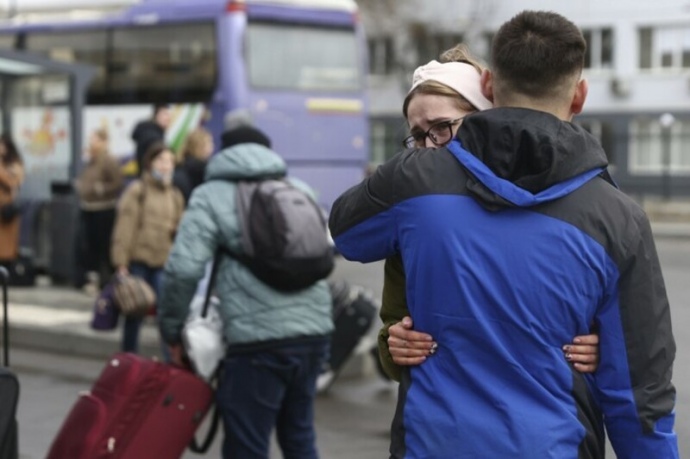
War forces everyone to grow up regardless of whether we are prepared to do so. To grow up so fast that our muscles can't keep up with our bones, skin stretches to its limit, wrinkles and slips off. But new skin will grow soon.
And it will turn out that being an adult is not so bad after all, as long as at some point in the past you were inoculated from adulthood, who helped you put on the armour made of love and steel. What will happen when I die? I don't know, but my daughter will know that she is worthy of love and that she can trust the world.
This is the luggage she can bring with her wherever she goes. It doesn't weigh anything. Even if she'd have to pack her entire life in two suitcases and flee, she'll be able to fit love in.
The most important thing is to manage to give the child love. I hope I can manage.
On humanity, Herr K., movement and pauses
"Russia has invaded Ukraine, Ira, this is war." This was the first thing my husband said to me when I woke up on 24 February. I went to work, got changed, made the rounds, and smiled to Herr Z., whose cancer spread to his liver but who was still oblivious to this fact.
I was thinking about one thing alone: How. Could. This.
Be. True. I had no clue what to do next, but I knew I had to call one person on my break.
I locked myself in the toilet and called Herr K., the editor of the Saxony Medical Journal. I thought that a journal read by every physician in Saxony could become a platform for raising money, medicine and equipment for Ukraine. It worked.
As soon as my article was published in the journal, a woman called me and said she wanted to give 10,000 euros to a hospital in Vinnytsia. I got phone calls from private doctors who wanted to donate their old ultrasound machine; secretaries of head doctors who'd already packed 40 boxes of wound dressings; vaccination centres that wanted to give us needles and bandages; retired surgeons who still had their tools and wanted to give them away. Sometimes Herr K. and I would get a coffee together.
His eyes filled with tears when he spoke about the war, about Ukraine's delicious tomatoes, about [Yurii] Andrukhovych, a Ukrainian writer whose books he read, about his Ukrainian colleague with a young son. "We have to do something," he said. And we did.
Our volunteering organisation helped over 2,000 Ukrainian refugees settle in Germany and sent tonnes of humanitarian aid to Ukraine. We appealed to hospitals for help, asking for equipment, medicine, and money. I don't know where we found strength and energy.
Maybe from refusal to accept our own powerlessness.
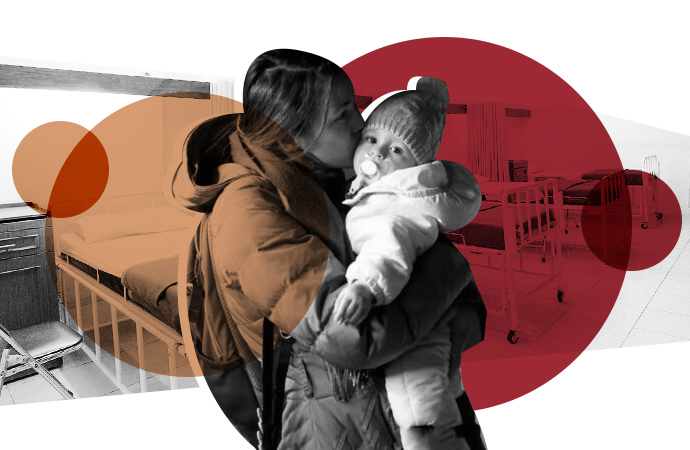
Over the course of the past year I have found out how fragile we are and how fragile the world around us is. We have no control over almost anything, but we can control our attitude to this lack of control. The pandemic prepared us for this, and the war has completed the transformation.
I have found out that I can endure a lot when I have hope. I have found out about different types of body armour and where to find tourniquets. On New Year's eve I asked my friends how they would describe 2022 in one word.
They said: "A shitshow." All at once. I can't disagree.
But I would have chosen a different word. For me, this year was about humanity. About how easy it is to lose it and how important to hold on to it.
I've realised that it doesn't matter how you keep going forward: tiptoeing, on all fours, crawling, howling, sighing, thinking you will never get there. It doesn't matter. What matters is that you keep moving.
And when you feel like you can no longer move, stop, because stops are also part of the journey. Stop, look at yourself, and look around. Who am I?
What am I afraid of? What matters to me? Then keep going.
Mykhailo Kryhel, Ukrainska Pravda
Translated by Olya Loza
Edited by Theresa Pearce